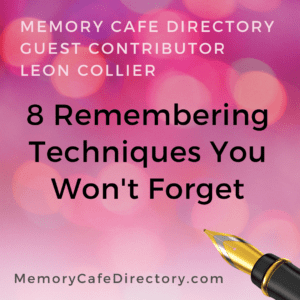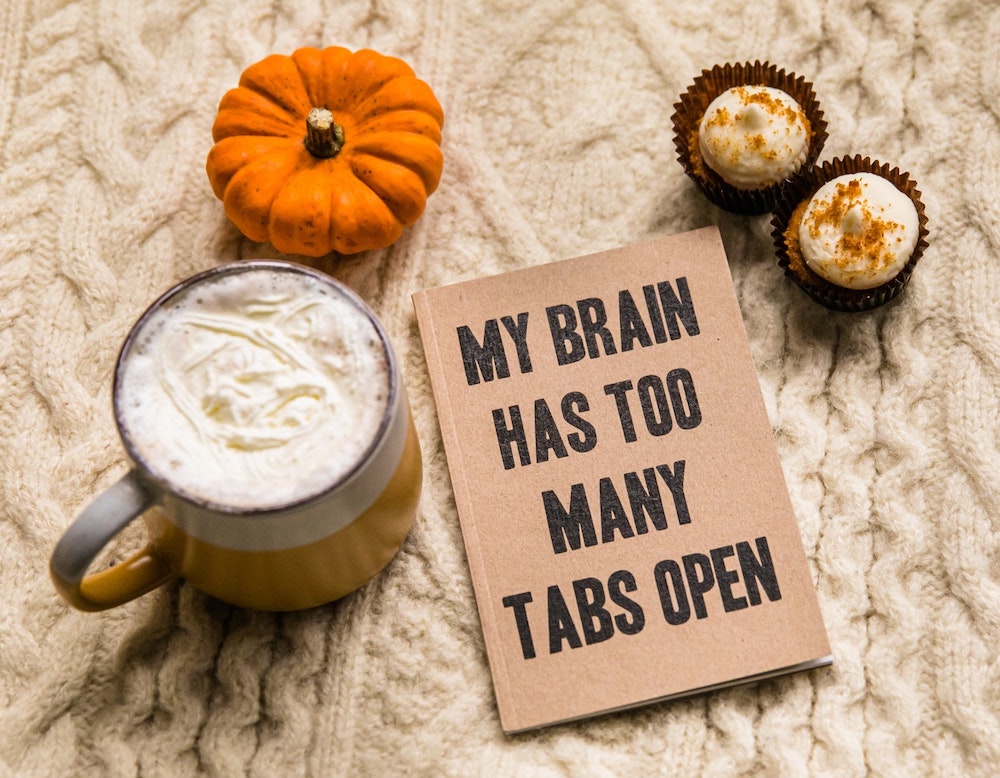Memory Cafe Directory posts and/or links to retailers can be advertising, sponsored, or affiliate links. We may earn a small commission from them. Thank you.
8 Remembering Techniques You Won’t Forget
Submitted by Guest Contributor
Leon Collier
Being able to remember things is not always as easy as we all may want it to be. Many of us would love to have everything at our fingertips (so to speak) when we need to.
For instance, it would be awesome to remember the name of the person you were introduced to just a few minutes ago, or to recall the next item on your grocery list without having to write it down. Fortunately, there are ways to make remembering easy. But before that, it’s essential to take care of your brain health to avoid illnesses like dementia.
There are several ways to keep your brain healthy and boost your memory. Because the brain is a muscle, it needs to be exercised to develop. Try these techniques if you are having trouble remembering things or need to remember many things at once.
1 Try Acronyms or Expression Mnemonics
There is no doubt that mnemonics are the best way to remember things that would otherwise be difficult to memorize. Remember how we used to memorize the nine planets? For many, “My Very Educated Mother Just Served Us Nine Pizzas” was the best way to remember the planets of the Solar System. The first letter of each word represents the names Mercury, Venus, Earth, Mars, Jupiter, Saturn, Uranus, Neptune, and Pluto.
Another great example if you belong to a music class is “Every Good Boy Does Fine,” used to memorize the lines of the treble clef.
2 Using Music Mnemonics
Remember the ABC song in kindergarten, as you learned the alphabet? It’s probably cliché by now and new ways to learn the alphabet have come up. However, the ABC song is a form of music mnemonics that can help you memorize a long string of words or letters.
You can use music to remember your bank account password or memorize the periodic table. Music offers a structure for information and encourages repetition. This allows memories to stick in your head for longer. Why else do you think advertisers often use jingles to try and sell you certain products?
3 Rhyming Mnemonics Can Also Help
Just like music mnemonics, rhyming words or sentences can help you remember something for longer. By rhyming every line in whatever information you are trying to keep for longer, you create a song-like pattern that is easy to remember.
For example, “30 days has September, April, June, and November, is a rhyming mnemonic used to memorize how many days are in each month.
It shouldn’t be tough to create a rhyming mnemonic. Look out for any two or three things that can rhyme in whatever you’re trying to store in your head. For example, if you want to remember weather patterns, you can use “Red skies at night, sailors delight, Red skies in the morning, Sailors take warning.” Or something similar. Remember, it doesn’t have to be perfect, just easy to remember.
4 Using the Rhyming Hook System
Also known as the Peg System, this technique uses numbers and words. It’s a little complicated and somewhat cumbersome, but if you can get it right, then you might just have a way of memorizing a very long list of items.
The system involves attaching a number to an image of a word that rhymes with it. For instance, Two = Zoo, Three = Tree, and so on. The images provide a hook to everything you want to remember. This method works best when you want to memorize a list of things in order.
5 Use the Memory Palace Method
Also known as the Mind Palace, or the Method of Loci, this memorizing technique uses familiar places to link pieces of information that you do not want to forget. It’s a sumptuous method of storing memory.
This method dates back to Roman and Greek times and has been used by famous orators of old. What happens here is you associate a familiar location – like the neighborhood you grew up in – with things you are trying to remember. Because you already have strong memories of the familiar location, you can easily remember any information you associate with it. This technique helps when you are trying to memorize a speech or details of a case.
6 Use Chunking
You probably already use chunking when you are sharing your phone number. Instead of giving each number on its own, you probably put it as say, “810” “454” “5432”. By grouping the numbers into smaller sections, you expand the limits of your working memory.
Chunking involves grouping things, looking for any patterns in them, and then organizing them. It’s not just your phone number that needs chunking. Your grocery list or events in history can be done using this method. If you have to multitask, you can use chunking to easily remember what should come next instead of doing things randomly.
7 Create Vivid Images in your Mind and Connect them to Important Information
I once read a blog that created a lot of gross images in my mind. Funny thing, however, I can still remember what the blog was about. Since then I have interacted with many blogs but I can’t remember nearly all of them. In a way, that blog was successful in grabbing the attention of its readers.
Apparently, the brain has a way of clinging to absurd images more than anything else. You can use the visualization method to remember literally anything; from people’s names to important numbers.
For example, instead of trying to remember Mike, you can associate the name with a microphone and imagine Mike with microphones popping out of his eyes.
8 Don’t Type It. Write It!
You are better off writing down on paper something you want to remember than typing it on a computer keyboard. This is because your brain is more engaged when writing by hand than when you are typing. The reticular activating system or RAS cells (located at the base of your brain) are stimulated. This makes the brain pay more attention to what you are doing at the moment.
Conclusion
These are just a few techniques that you can use to make your brain do a lot more for you than it usually does. Other methods include lifestyle changes like getting enough sleep, improving your diet, and exercising. Even as you use the above methods, these should be done to keep your mind in tippy-top form.
About the Author: Leon Collier

Leon Collier
Leon Collier is a blogger and academic writer from the UK who works with top essay writing companies for those who want to order a college essay.
He likes trying new subjects and is always focused on proving his worth as a writer in new and challenging areas. His hobbies include reading books and playing tabletop games with his friends.
You can reach him via Twitter @LeonCollier12.
Become a Contributor!
 Do you want to be a Memory Cafe Directory contributor? If you have helpful information to share with our community, read about the guidelines, then get in touch to discuss what you have to offer.
Do you want to be a Memory Cafe Directory contributor? If you have helpful information to share with our community, read about the guidelines, then get in touch to discuss what you have to offer.
Thank you.





